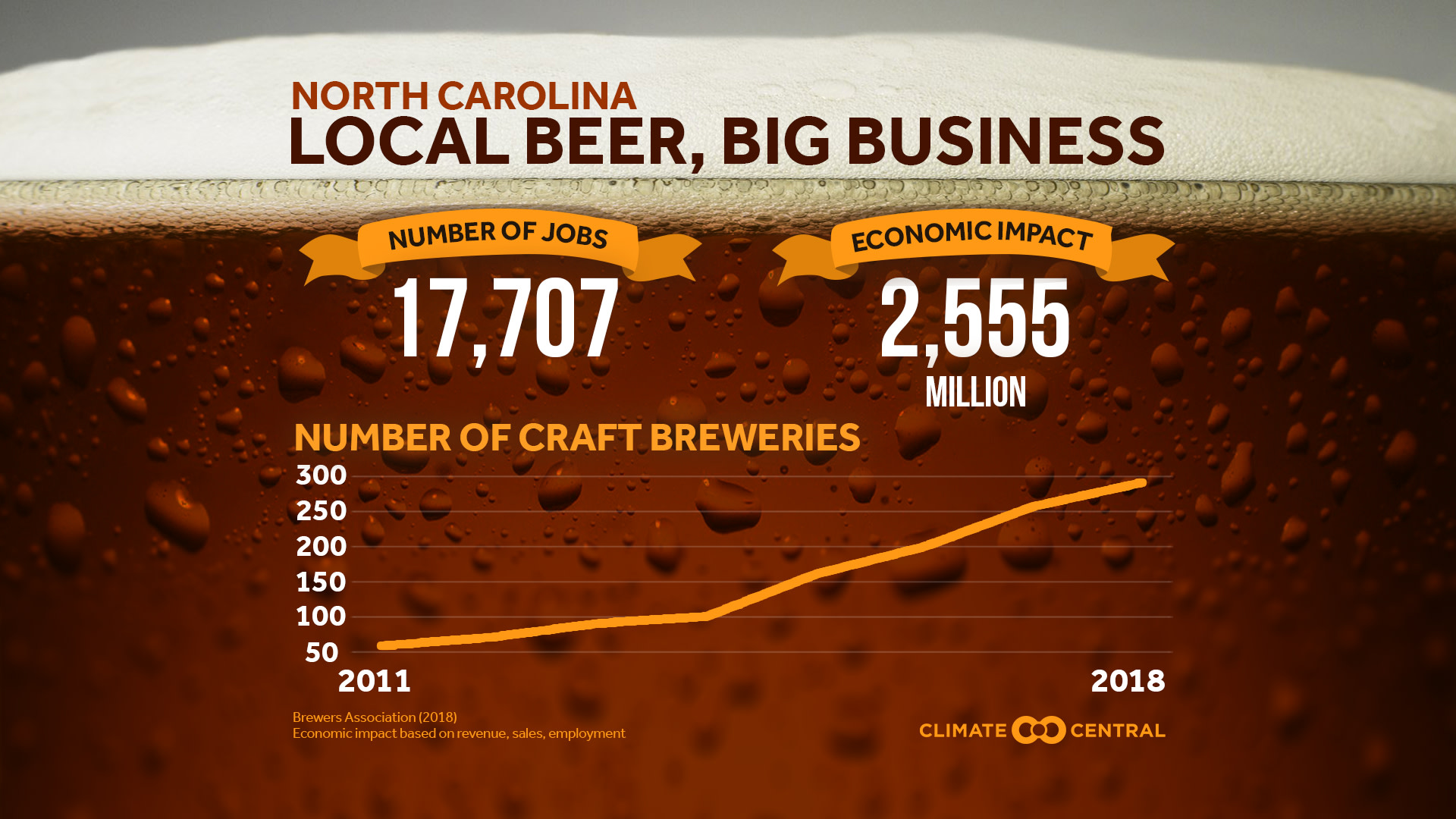KEY CONCEPTS
Beer is a significant contributor to many local economies, with craft breweries alone contributing more than 550,000 jobs in 2018. Economic impacts are highest per capita in Colorado, Vermont, Oregon, Pennsylvania, and Maine.
Trouble is brewing as climate change threatens the key ingredients in beer. Hops, barley, and water are at risk from increased heat and precipitation extremes.
Brewers are pursuing solutions to reduce water usage, encourage more sustainable farming, limit material use, and power facilities with clean energy.
READY-TO-USE GRAPHICS
Next Tuesday is St. Patrick’s Day, and while some opt for green beer in color, others are greening their brews in a different way—in order to respond to climate change.
Beer is a significant contributor to many local economies. In 2018, local craft brewers accounted for nearly a fourth of the nation’s $114 billion beer market. Craft breweries also contributed more than 550,000 jobs, according to an annual study from the Brewers Association. Per capita outputs were highest in Colorado, Vermont, Oregon, Pennsylvania, and Maine.
However, trouble is brewing as climate change threatens the key ingredients in beer. According to a 2018 study in Nature Plants, extreme heat and drought can have a sobering effect on yields of barley (the most common grain in beer). In addition, nearly all U.S. hops are grown in Washington, Oregon, and Idaho—where the necessary water from snowpack is trending downward.
Brewers and researchers are working to adapt to these changes. For example, Anheuser-Busch InBev has partnered with The Nature Conservancy to preserve water supply in the West, while establishing “water funds” in Latin America to help protect water quality there. Other projects are working towards pest-resistant hops or drought-resistant barley.
Many brewers are also reducing their own environmental footprints. Some are powering facilities with renewable electricity, while others are deploying electric vehicles for transportation. But sometimes, materials like glass may have a larger footprint than energy, as the New Belgium Brewing Company discovered. Using recycled bottles and improving the complete supply chain—including how beer is made, packaged, and shipped—could help reduce these impacts.
POTENTIAL LOCAL STORY ANGLES
How is climate change affecting farmers near you?
The USDA has detailed statistics and maps on where barley and hops are being grown—and directories for farmers by zip code. To see how climate change is affecting agriculture in your area, check out regional breakdowns from the National Climate Assessment.
How are local brewers promoting sustainability?
What better time to cover green practices than St. Patrick’s Day—the biggest day of the year for beer-drinking at bars and restaurants. Breweries around the country are working on sustainable solutions—from cutting energy use in buildings to capturing CO2 from the fermentation process itself.
EXPERTS TO INTERVIEW
LOCAL INTERVIEW IDEAS
Talk to a local brewer in your community. Is climate change affecting their barley, hops, or other ingredients? Are they shifting to more sustainable practices? The Brewers Association has a detailed directory of breweries.
The SciLine service,500 Women Scientists or the press offices of local universities may be able to connect you with local scientists who have expertise on changing climate patterns in your area. The American Association of State Climatologists is a professional scientific organization composed of all 50 state climatologists.
NATIONAL INTERVIEW SUGGESTIONS
Angie Slaughter
VP of Sustainability Procurement, Anheuser-Busch
Contact through Molly Kunst (Email) molly.kunst@anheuser-busch.com
Phone: (518) 409-2765
Bart Watson, PhD
Chief Economist, Brewers Association
Contact through Jenelle Scott (Email) Jenelle.scott@backbonemedia.net
Phone: (970) 963-4873 x224
Aaron J. Staples
PhD Student and Research Assistant of Agricultural, Food, and Resource Economics, Michigan State University
Areas of focus: beer value chain, behavioral economics, sustainability
Email: staple71@msu.edu
Phone: (412) 228-1131
Carson Reeling, PhD
Assistant Professor of Agricultural Economics, Purdue University
Areas of focus: agricultural conservation, climate change, water pollution
Email: creeling@purdue.edu
Phone: (765) 496-6197
Available for interviews in Spanish
METHODOLOGY
Economic statistics provided by the Brewers Association for Small and Independent Craft Brewers.
